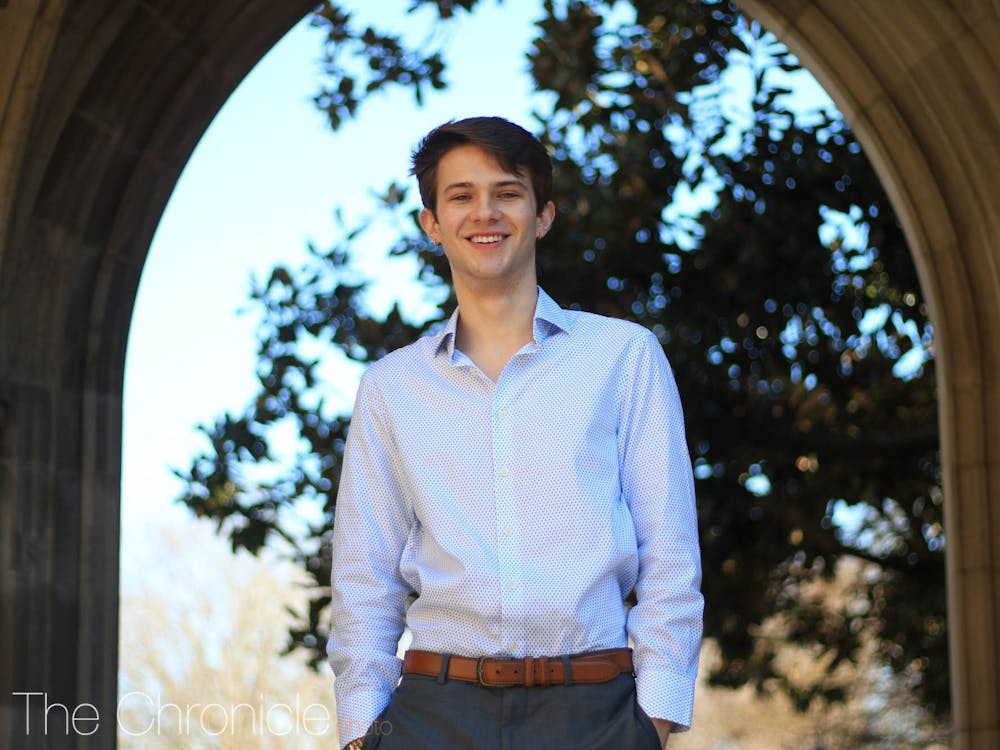If Zac Johnson wins the race for Duke Student Government executive vice president, he hopes to initiate long-term collaborative projects that address underrepresented students’ concerns.
Johnson, a junior, currently serves as DSG’s vice president of services and sustainability. He joined DSG as a first-year in the hopes that its project-oriented model would allow him to apply his commitment to social justice issues to create “real change and impact on students’ lives,” he said.
Johnson’s platform includes increasing DSG’s transparency in communications with the student body and conducting listening sessions with affinity groups. After gauging students’ needs, Johnson hopes to create projects focused on addressing those needs. In order to maintain consistent communication with the student body, he plans to utilize the power of the EVP position to establish project task forces, which would include non-DSG students and faculty members.
Johnson’s campaign platform also includes the establishment of a formal review process for proposed DSG projects to ensure students are not “offloading the labor of their projects onto students of marginalized identities,” an issue that DSG has been called out for in the past, he explained.
One of Johnson’s proposed projects is the creation of a Duke crash course, a tool designed to provide a “common footing” by educating students about Durham and the University’s racial and socioeconomic history. The course, which he calls his “project baby,” was part of his platform when running his current position last year.
“Plenty of both faculty and students have called for some kind of course that will equalize students’ awareness on racial justice, especially in North Carolina,” said Johnson. “Now, with the reorganizing of housing on campus, COVID adaptations, Greek life, they’re basically crafting an entire new Duke right now. This is the perfect time to get in there and make sure that this course happens and teaches us effectively.”
As a result of Johnson’s efforts, Duke administrators have already created a faculty council to discuss what will be included in the course. Johnson said that he hopes that the course will “come to fruition in a way that isn’t performative or inadequate.”
Johnson also plans to push for policy changes that reflect the impact of COVID-19 on student life. For example, he wants to allow students who are living in Duke-sponsored housing off-campus to opt out of the dining plan, especially low-income students who would “undoubtedly benefit from budgeting their own money,” he said.
Johnson spent his first year at Duke committed to bridging “informational disparities on campus.” As a low-income student, his personal experiences at Duke have compelled him to “pursue project work and changes at the University level that can help students out who have similar backgrounds,” he said.
Johnson helped to start a resource called “Being Not-Rich @ Duke: A Guide” which is a consolidation of resources, with an emphasis on financial literacy, to assist low-income students as they navigated through their undergraduate years at Duke. His platform for EVP includes completing and publishing the guide this fall.
During his sophomore year, Johnson helped bring fresh fruit to Sprout and the East Campus store, increasing student access to fresh produce on food points. As vice president of services and sustainability this year, he collaborated with the Undergraduate Environmental Union to bring a greater environmental focus to his committee’s project work, including an upcoming waste audit.
Johnson grew up in Chapel Hill, N.C., where he was able to witness and participate in North Carolina’s activism, specifically the Historic Thousands on Jones Street march and the environmental justice movement. He said that those experiences have had a profound influence on his platform.
“My biggest conclusion from being involved in a lot of social justice work throughout my life is seeing the inadequacy of the government, but also all the different ways that the government can help,” Johnson said. “We can do a lot, and I really see that DSG has the potential to do a lot. And I want to be part of that process because I’ve been able to do it before.”
Adam Hollowell, senior research associate at the Samuel DuBois Cook Center on Social Equity, spoke to Johnson’s ability to redefine and maximize the impact of the EVP role.
“He understands the challenging work of fostering equity within the standards and practices of an institution like DSG,” Hollowell wrote in an email. “He cares deeply about the community at Duke and will prioritize making connections with students and administrators across entrenched dividing lines.”
Junior Sara Heilman, a friend of Johnson’s, met him in Hollowell’s class during their first year at Duke. The two have tried to take a class together every semester, during which Heilman said that she has witnessed Johnson’s commitment to equity and accessibility issues and his growth as an advocate.
The first thing she noticed was that he was passionate and confident. But over the years, she’s seen Johnson “use that confidence to create space for other people.”
“I’ve watched him really straddle that line nicely between speaking up and digging deeper into what he hears from the people around him, but also being a really good listener,” she said.
Heilman also highlighted that Johnson’s commitment to DSG hasn’t wavered since that first year.
“I know that he would bring all of that enthusiasm to the role just because it’s something that’s really close to his heart,” she said. “And everything on his platform, all of those really do come from a place in his heart of genuine care.”
Get The Chronicle straight to your inbox
Signup for our weekly newsletter. Cancel at any time.

Milla Surjadi is a Trinity junior and a diversity, equity and inclusion coordinator of The Chronicle's 119th volume. She was previously editor-in-chief for Volume 118.

